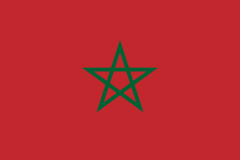Flaga Maroka
 | |
| Informacje | |
| Proporcje | 2:3 |
|---|---|
| Opis flagi | ciemnoczerwone tło z pięcioramienną zieloną gwiazdą umieszczoną pośrodku |
Flaga Maroka – ciemnoczerwony prostokąt o proporcjach 2:3 z zielonym pentagramem umieszczonym pośrodku flagi.
Według artykułu 7 konstytucji Maroka „Symbolem Królestwa jest czerwona flaga z pięcioramienną (pentagram), zieloną gwiazdą umieszczoną pośrodku …”. Ustawy z 1915 i 1956 dodatkowo precyzują, że „(gwiazda) ma być umieszczona pośrodku flagi i być wielkości jednej trzeciej szerokości flagi.”
Historia i symbolika
Pierwsza flaga Maroka przypominająca wyglądem dzisiejszą flagę powstała po przejęciu władzy przez panującą do dziś dynastię Alawitów około 1666 roku. Wcześniejszą jednolicie białą flagę zastąpiono wówczas flagą o jednolitym ciemnoczerwonym kolorze, będącym symbolem szarifów z Mekki. Po objęciu protektoratu Maroka przez Francję do flagi dodano sześcioramienną, zieloną gwiazdę (zieleń jest symbolem Islamu) symbolizującą życie, mądrość i zdrowie. Okoliczności i motywy dla których gwiazda sześcioramienna została zastąpiona gwiazdą pięcioramienną nie są jasne, zmiany dokonano w 1915. Według najczęściej spotykanej wersji pięć ramion gwiazdy ma symbolizować pięć podstawowych zasad Islamu.
Flaga Maroka z lat 1258-1420
Flaga Maroka z lat 1554-1659
Flaga Międzynarodowej Strefy Tangieru z lat 1923-1956
Media użyte na tej stronie
Autor:
- Coat_of_arms_of_Morocco.svg: SanchoPanzaXXI
- derivative work: Fry1989 (talk) 00:52, 1 September 2010 (UTC)
Royal Standard of Morocco
A white flag inscribed with the Shahada (in Maghrebi script).
This is supposedly a banner used by the Almoravid dynasty in Morocco (11th to 12th centuries). This claim is apparently due to an entry at the "Flags of the World" website:
- "The use of the flag in Morocco as a symbol of the state dates way back to the Almoravide dynasty (1062-1125 AD). Prior to this time, white silk banners were often carried in battle,sometimes with Koranic inscriptions written on them. The Almoravides institutionalized this practice. They gave one banner to every unit of 100 soldiers; the leaders always carried one inscribed: «There is no god but god, and Mohammad is His Prophet». The two following dynasties (the Merinides and the Saadiens) continued the use of the White flag as the symbol of the State." (Dov Gutterman, 17 Apr 1999)
Note that no source is being given for this claim, the best we can do at this point is say that we heard it from Dov Gutterman in 1999. Also note that the imlied claim that the modern form of the shahada was written on the flags.
This is not only unsubstatiated but also implausible, as medieval sources tend to give a longer form of the shahada, lā ilāha illā-llāh waḥdahu lā šarīka lahu, muḥammadan ʿabduhu wa rasūluhu. It is completely unclear when the modern form is first recorded, let alone when it can first be shown to have been written on a flag (the earliest positive reference we have for this in the en-wiki's shahada article is the earliest 20th century, possibly (without explicit reference) traceable to flags used by Wahhab in the 18th century.Flag of Morocco during the rule of the Alaouite dynasty (17-20).
The oldest known flag of Morocco, is shown in the Libro de Conoscimiento de Todos los Reynos (an online version is available here, see page 26). This flag is supposed to have been used by the rulers in Morocco in XI-XIIIth century. The flag is red with a 64-square chessboard placed in the middle of the flag. The upper left square of the chessboard is white.
Flag/War-flag of Marinid (1258-1420) and Saadi (1554-1659) dynasties in Morocco. White banner is also reported.
Autor: Flaspec, Licencja: CC BY-SA 4.0
Merchant flag of the French Protectorate of Morocco (NOT the national flag).
Merchant flag of international zone of Tangier.
Merchant flag of the Spanish Protectorate of Morocco (NOT the national flag).
Autor: Flaspec, Licencja: CC BY-SA 4.0
Variant flag of Morocco during the rule of the Alaouite dynasty (17-20).
Flag/banner of Idrisid (780-974) dynasty in Morocco. Also used as a banner (NOT flag) during Marinid (1258-1420) and Saadi (1554-1659) dynasties.



























